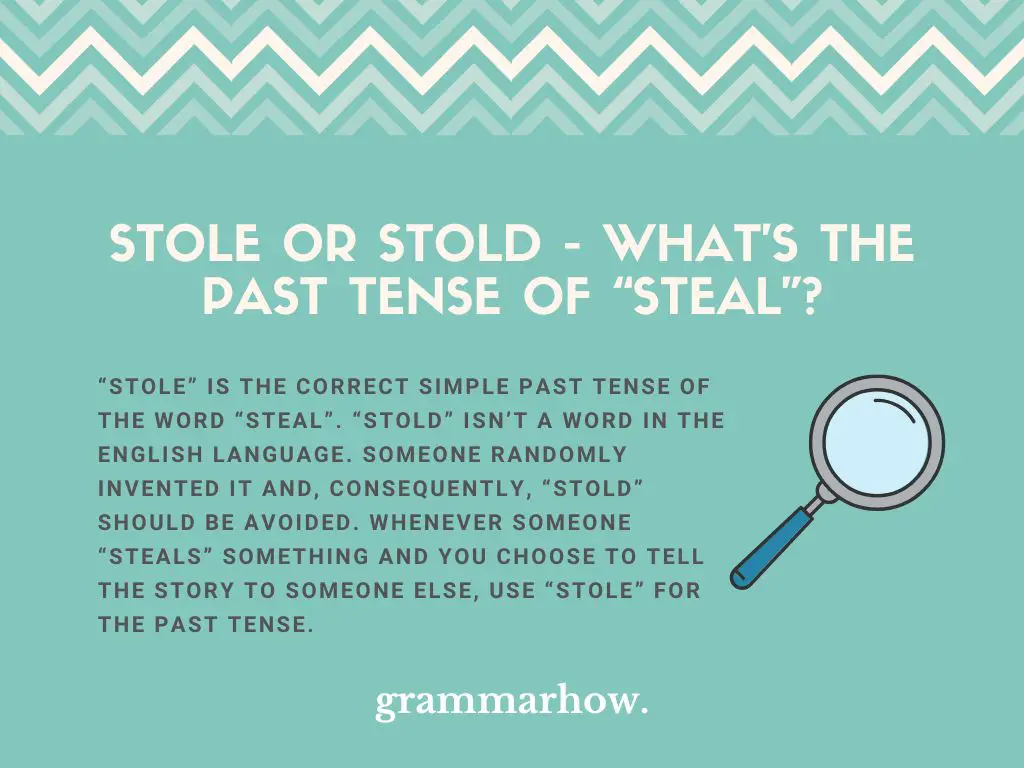When something was taken without prior authorization, do you say someone “Stole” it, or “Stold” it?
Let’s find out the past tense of “Steal” and what’s the appropriate way to address a situation that involves stealing in the past tense. We also want to know the meaning of the word.
Stole or Stold – What’s the Past Tense of “Steal”?
“Stole” is the correct simple past tense of the word “Steal”. “Stold” isn’t a word in the English language. Someone randomly invented it and, consequently, “Stold” should be avoided. Whenever someone “Steals” something and you choose to tell the story to someone else, use “Stole” for the past tense.

Take a look at some examples:
- The boy stole something from the store.
- The boy stold something from the store. (incorrect)
“Stold” isn’t a word. We don’t know who came up with that form but the truth is there’s no way around it. Simply put, “Stold” isn’t a word in the English language and has no meaning or usage. You should always avoid using the form “Stold” because it’s incorrect.
When referring to the past tense of “Steal”, always use “Stole”.
Stole
“Stole” is the correct past tense of the verb “Steal”. You should use this word when talking about a stealing episode in the past tense. “Steal” is to take something from someone without permission or knowledge.
The Cambridge Dictionary agrees with that definition, and adds the following: “take something without the permission of its owner”. “Steal” as a noun can have other meanings too, but our focus here is on its meaning as a verb and its past tense – which is “Stole”.
Let’s look at some good examples:
- Bruno told me you got in trouble because you stole something.
- Is it true you stole from Priscilla? Tell me.
- I’ve never stolen anything, and I can’t understand why someone would do it.
- The kid stole a pack of gum from the convenience store but got caught.
- Brianna stole the pen she borrowed from me.
- I never stole anything from anyone, so the accusation was extremely painful.
Stold
“Stold” is an incorrect form for the past tense of “Steal”. Because “Steal” is an irregular verb, its past tense isn’t as obvious as it’d be for other words. That leads to speculation and people making incorrect assumptions about what the past tense of “Steal” should look like.
Is “Stold” a word? The fact of the matter is that it’s not. The Cambridge Dictionary doesn’t acknowledge “Stold” as a word. This form is nothing but an invention that makes no sense and should never be used.
Let’s see some examples that include the incorrect form “Stold” followed by a corrected version of the same sentence.
- The truth is you stold Olivia’s heart. (incorrect)
- The truth is you stole Olivia’s heart.
- Hank stold a large amount of money from his brother. (incorrect)
- Hank stole a large amount of money from his brother.
- I can’t believe Linda stold from you. (incorrect)
- I can’t believe Linda stole from you.
Which Is Used the Most?
Which one of those forms is used more often, “Stole” or “Stold”? Let’s take a look at the graph from Google Ngram Viewer below.

When comparing a correct word with an incorrect one, we can often guess what the graph will show. Did you guess it right, too? “Stole” is the prevalent word, that appears on the graph as being used more often.
This is what we expected to see because “Stole” is the correct past tense for the word “Steal”. “Stold”, which is an incorrect form, appears at the very bottom of the graph – as it should because all incorrect forms should be avoided.
Whenever you need to use the verb “Steal” in the past tense, choose to use “Stole”. That’s the correct form that will make your sentences appropriate and idiomatic.
“Stold” should never be used.
Final Thoughts
“Stole” is the correct past tense for the word “Steal”, which means to take something from someone without permission. “Stold” is an incorrect form for this word, which should always be avoided and never used. When you need to discuss a stealing episode in the past, use the word “Stole”.

Martin holds a Master’s degree in Finance and International Business. He has six years of experience in professional communication with clients, executives, and colleagues. Furthermore, he has teaching experience from Aarhus University. Martin has been featured as an expert in communication and teaching on Forbes and Shopify. Read more about Martin here.
